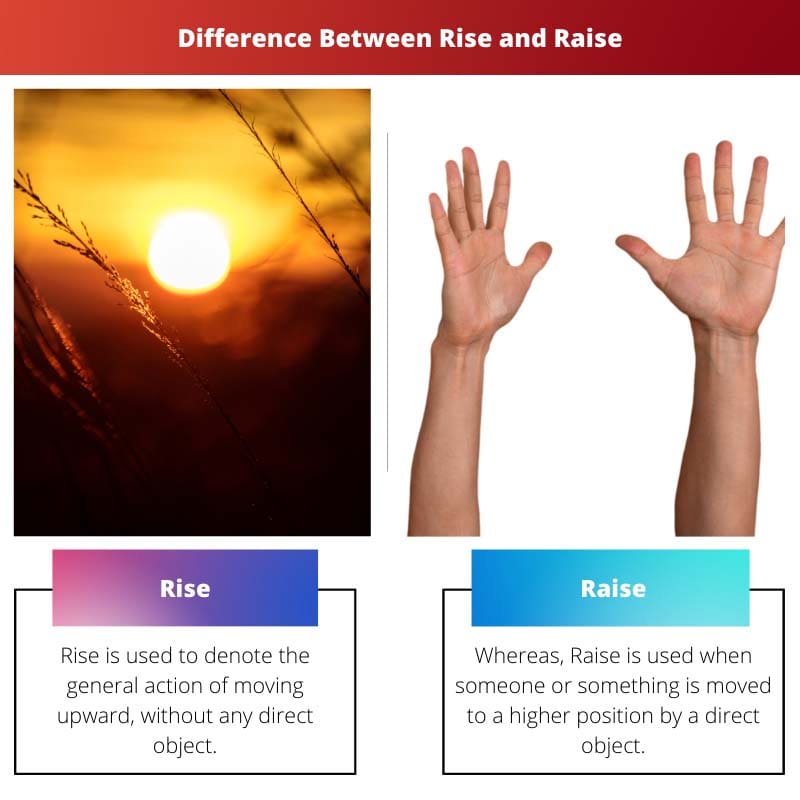Many words in the English language might leave one confused because of their similar spellings or pronunciations. For example, lose and lose, except and accept, further and farther, principle and principal, etc.
Many words may sound or look alike but have distinct meanings, such as pore and pour.
Pore is a minute opening in a surface, especially in the skin, through which gases, liquid, or microscopic particles may pass, whereas, on the other hand, pour means to flow rapidly in a steady stream. Similarly, there are many cases just like the above.
Key Takeaways
- “Rise” is an intransitive verb that means to move upward or to increase in level or amount, while “raise” is a transitive verb that means to lift, elevate, or increase something.
- “Rise” does not require a direct object, as it describes a self-directed action or change, whereas “raise” needs a direct object to specify what is being lifted or increased.
- Both verbs describe upward movement or growth, but their grammatical structure and usage differ based on whether the action is self-directed or applied to something else.
Rise vs. Raise
The difference between Rise and Raise lies in their meanings; rise means to move from a lower position to a comparatively higher position; on the other hand, raise means to move to a higher position.

Comparison Table
| Parameter of Comparison | Rise | Raise |
|---|---|---|
| Meaning | Rise denotes the general action of moving upward without any direct object. | Whereas, Raise is used when a direct object moves someone or something to a higher position. |
| Transitive/ Intransitive Verb | Rise is an intransitive verb. | Raise is a transitive verb. |
| Tenses | The word “Rise” has three forms, i.e., rise, rose, and risen. | In the case of Raise, it also has three forms, i.e., raise, raised, and raised. |
| Irregular/ regular verb | Rise is an irregular verb, i.e., a verb in which the past tense is not formed by adding “ed” at the end of the world, such as sing, feel, and go. | On the other hand, raise is a regular verb, which means it follows one of the typical existing patterns. |
| Examples | An example of rising is: “When the Sun rises, it appears in the sky.” | An example of Raise is: “The teacher asked the students to raise their hands if they know the answer.” |
When to Use Rise?
The word rise has several definitions, many denoting the meaning as the upward movement or ascending of a matter or person. However, it can mean anything from being a rebel, getting up, increasing, or even returning from death.
It can be used as a countable noun, singular noun, and phrasal verb. Rise is an irregular verb.
Irregular verbs are also known as solid verbs; these are the verbs that do not follow the general rule of the past tense or past participle form, i.e., to add “ed” at the end of the world, for example, put remains put in the past as well as the future tense.
The following are the cases in which the word rise can be used:
- If something, particularly an object, rises or moves upwards: For example, “He watched the smoke rise from the chimney.”
- If someone gets out of bed: “Robert had risen early and gone to the office for work.”
- If an object appears of a sizeable tall shape: For example, “The building rose before him, tall and stately.”
- If the level of something (e.g., water) rises: For example, “The water continues to rise as 1,000 people were evacuated from the region.”
- As a countable noun: For example, “The pub itself was on the rise, commanding views across the countryside.”
- If the amount increases: For example, “The tourist taxes of the country rose by 10.7% in June last year.”

When to Use Raise?
Raise is a regular verb, a verb whose conjugation follows the typical pattern or one of a specific pattern; it has three forms, i.e., raise, raised, and raised. It refers to the increase in position.
In other words, it means to lift something to a higher position. Moreover, it must have an object; otherwise, applying the phrase raise would not be possible.
In other words, something raises something else. For example, “Our favorite Italian restaurant has raised its pricings again.”
The following are the scenarios in which the word rise can be used:
- When you have to raise something higher: For example, “He raised his hand to wave at Sharma.”
- When you have to set it upright: For example, When the projection screen toppled, he went to raise it again.”
- To increase a bet: For example, “My cards weren’t good enough to let me raise.”
- To increase the amount of salary or wages: For example, “He got a raise of five-dollar to his existing salary,”

Main Differences Between Rise and Raise
- Rise refers to a movement performed by someone or something without the help of any external force, whereas, on the other hand, Raise refers to the action performed on a direct object with external power.
- The rise cannot take a direct object, whereas, in the case of Raise, it performs its actions on the natural object and cannot be executed without it.
- The rise may or may not be used regarding monetary matters. However, the word raise is used to denote the increase in amount. For example, John is expecting a raise at his new job.
- Rise is an irregular verb, on the other hand, raise is a regular verb.
- Raise is used just after the object, for example, “to raise funds,” whereas, on the other hand, “rise” does not require an object, for example, “the sun rises” or “high rise”.


This article is very helpful in differentiating between the meanings of similar words. It could easily prevent many grammar mistakes.
I couldn’t agree more. It’s so important to be precise in language, and understanding these differences is key.
I’d never really thought about how many words are similar in English but have completely different meanings. This has been very informative for me.
I agree! It’s been really eye-opening to see the differences between words that I thought were interchangeable.
I never knew the differences were so nuanced between ‘rise’ and ‘raise’. This article has been quite enlightening.
Absolutely. It’s like a whole new world of understanding has been opened up. Excellent work from the writer!
The detailed comparison table is very useful and concise. It’s easy to understand the differences between ‘rise’ and ‘raise’ now.
Yes, I completely agree. The comparison table really helps in highlighting the distinctions between the two words.
Definitely, the main takeaways are very clear and I have a better grasp of how to use these words correctly now.
The comparison between ‘rise’ and ‘raise’ is illustrated really well. Excellent work in providing both the similarities and differences.
I appreciate the clear examples provided for both ‘rise’ and ‘raise’. It helps make the distinction more easily understandable.
I completely agree. The examples truly solidify the understanding of how these words are used in different contexts.
Thanks for explaining the distinctions between ‘rise’ and ‘raise’. I can see myself using this article as a reference in my future writing.
Absolutely. I’m already feeling more confident about my grammar just from reading this.
Definitely. This is a valuable resource for anyone looking to enhance their language skills and understanding.
This is quite interesting and educational. I’m glad I stumbled upon this article.
Absolutely agree. Knowing the differences between words is vital, and this article does a great job in explaining them.
This article does an excellent job of breaking down when to use ‘rise’ and ‘raise’. I’m impressed by the details provided.
Agreed. It’s a well-researched piece that provides valuable insights into the differences between these words.
Well, I never thought I’d be having an in-depth discussion about ‘rise’ and ‘raise’. It’s quite fascinating, actually.
I know, right? Who knew these two words had so much to consider? This article really brings things into perspective.